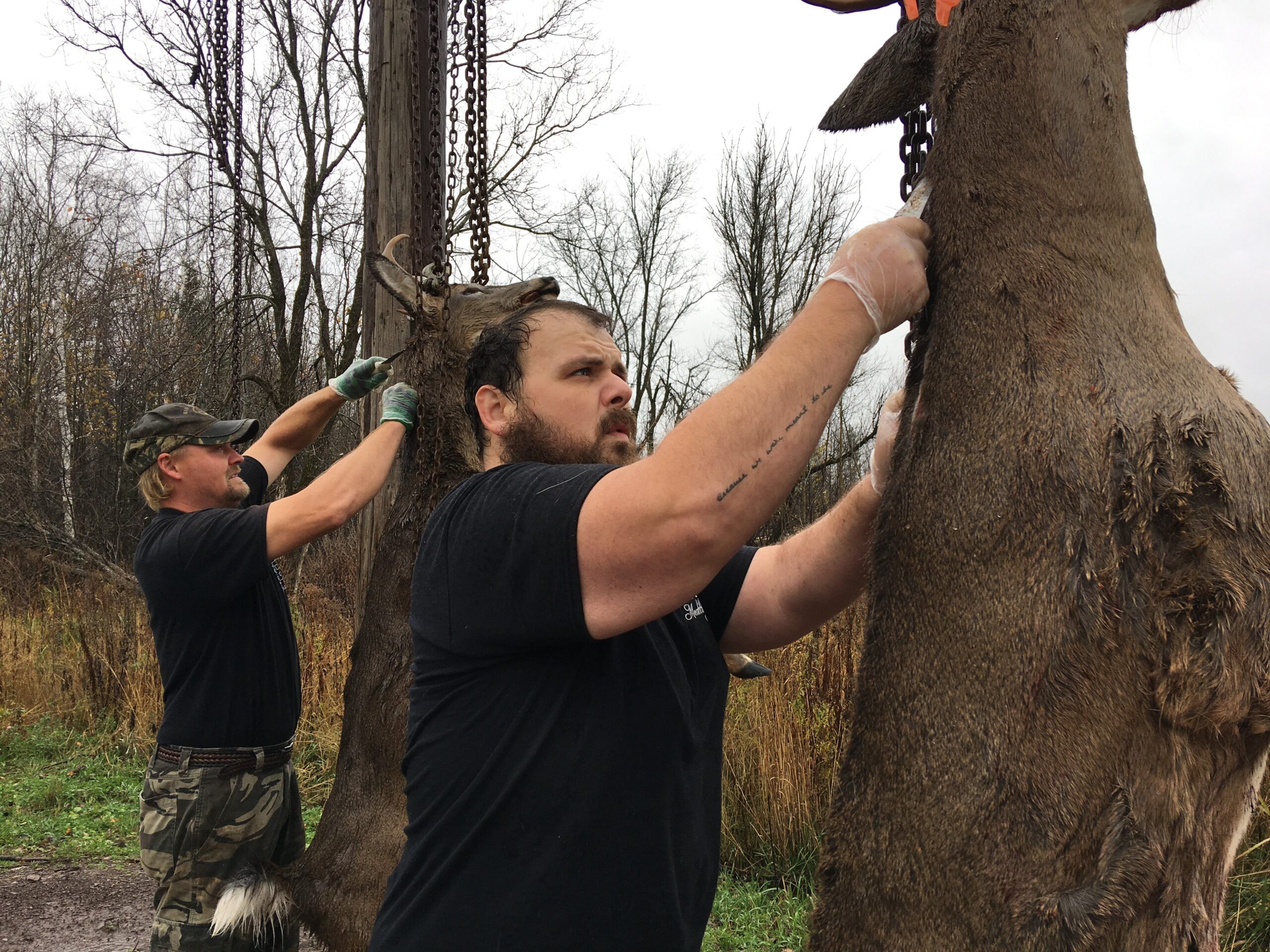
Hunters who bag a deer, moose or bear in Maine can donate some or all of the meat from the animals to help feed the needy through the Maine Hunters for the Hungry program.
“It’s a wonderful opportunity for us to get meat into our pantries,” said Dixie Shaw, director of the Hunger and Relief Services for Catholic Charities of Maine, which has benefitted from the little known Hunters for the Hungry program. “People cannot always afford meat.”
Hunters cannot donate meat directly to charities, but must first go through a licensed processor affiliated with Hunters for the Hungry.
Currently, five processors are registered to cut for the program in Aroostook County, including Troy Haines of SPW Meat Cutting in Mapleton.
Haines has been processing meat for Hunters for the Hungry for about 10 years now, and said if he were to estimate how many animals he has processed for the organization in that time, it would be less than 20. This low number, Haines said, is because he feels many hunters are unaware the program exists, though it has been around since 1996.
“It’s amazing how many hunters don’t know about it,” he said.
He thinks this is especially true with regard to bear hunters, who often hunt for sport or trophy, rather than meat.
“If I had to guess a percentage, I would say 65 percent of bear hunters just abandon the meat,” he said.
Haines suggested the state should send out literature about the program when it issues hunting licenses and permits.
In an effort to get the word out, Gov. Paul LePage sent a press release in late October to multiple media outlets encouraging outdoorsmen to consider donating to the program “to help families in need while participating in a traditional Maine outdoor sport. Donations provide meat to food pantries, soup kitchens and shelters.”
Hunters need not donate all of the meat from the animal after a successful hunt, but can choose to donate only a portion of the meat, and keep some for themselves, depending on what works best for them.
“I had a guy this year come in and donate almost an entire moose. He knew he wasn’t going to be able to go through the whole moose himself,” Haines said.
“The program itself takes care of processing costs as well,” Haines added. The hunter only needs to pay the percentage of the processing fee that correlates with the amount of meat he decides to keep. The processor will then invoice Hunters for the Hungry for the remaining amount of the processing fee, which the program will reimburse to the processor.
Hunters can bring the game to a registered Hunters for the Hungry processor, who will contact Jason Hall, who heads up the program and also is director of the federal Emergency Food Assistance Program which is operated in Maine through the Department of Agriculture, Conservation and Forestry.
When a processor informs Hall that a hunter has donated meat, Hall contacts food pantries, soup kitchens, and homeless shelters throughout Maine, to let them know the meat is available for pick-up.
Following a successful hunt in Aroostook County, Hall contacts Dixie Shaw of Catholic Charities of Maine.
“I’ve known Dixie for 20 years. When there’s a donation in The County, I don’t drive five hours to get it; I call Dixie. She’s the best person you can have handing out meat to pantries. I don’t reinvent the wheel,” Hall said.
Shaw is more than happy to receive Hall’s calls.
“To me, Hunters for the Hungry is great,” she said.
Catholic Charities of Maine helps alleviate hunger throughout Aroostook County, serving 253,000 pounds of food to 23,000 people through 24 food pantries from St. Francis to Wytopitlock.
The Maine Hunters for the Hungry program accepts bear, deer and moose donations to be distributed to food pantries, soup kitchens and shelters. Road kill donations also are accepted, provided the meat is not damaged.
The program pays participating processors 80 cents per pound, hanging weight, to process the wild animals, according to Hall.
“We have some rationalization for that,” Hall said. “Many believe it should be pro bono. We believe that hunger is a byproduct of poverty and if we can pay someone for a service, they make money, can hire staff, and ultimately don’t have to utilize a pantry or soup kitchen.”
In recent years, the program has been funded through donations from the Wal-Mart Foundation.
“Over the last four years we have been involved with the Wal-mart Distribution Center in Lewiston. They work with us and we get a generous donation annually from the Wal-Mart Foundation, big enough to cover the annual expenses for the program annually,” Hall said.
With deer season just underway, Shaw has a message for the sportsmen who will be venturing out into the Maine woods.
“To all the hunters out there: stay safe, have fun and if you would be so inclined we would love to have any and all meat that you would be interested in donating to Hunters for the Hungry,” she said.
For more information about Maine Hunters for the Hungry, check out the program on Facebook at Maine Hunters for the Hungry.
Meat processors who are interested in participating in the program, or hunters interested in donating meat or connecting with a participating processor, should call Jason Hall at 207-287-7513.
To inquire about donating foods other than wild game to Catholic Charities of Maine, contact Dixie Shaw at dshaw@ccmaine.org or (207) 493-8919.
Among the participating meat processors who can be contacted in Aroostook are:
— SPW Meat Cutting, Troy Haines, Mapleton, 207-551-1301;
— Dube’s Custom Meat Processors, Adam Dube, Frenchville, 207-316-8685;
— Joe Chasse, Fort Fairfield, 207-472-0141 or 207-227-5094;
— Brian Henderson, Littleton, 207-538-9096; and,
— Hatch’s Custom Meat Cutting, Brady Hatch, Island Falls, 207-441-4023.







